If you want to have a healthier body, consider switching to a vegan diet. There are so many amazing benefits of eating a plant-based diet rather than eating animal products. This vegan diet for beginners guide will help you get started and show you how it can help you lose weight.
Vegan Diet For Beginners
How to Plan for a Healthier Plant-Based Lifestyle To Help You Lose Weight and Transform Your Life

What Can You Eat on a Vegan Diet?
When you follow a vegan diet, you no longer eat any animal products. Not only does this mean no more meat, poultry, and fish, but you don’t have eggs, milk, dairy, butter, or even honey.
On a vegan diet, you will eat foods like grains, legumes, beans, fruits and vegetables, and other food items that you can make when you combine them.
There are also familiar food items made with meat substitute products. For example, you can find meat and dairy products like cheese and ice cream, non-dairy yogurt, mayonnaise, and burgers all made from substitutes. Food items such as non-dairy milk substitutes, tofu, and soy milk are also popular with vegans.
Yet, this does not mean that the vegan diet is only limited to the food items mentioned above. Vegans also eat everyday food items like spaghetti, green salad, peanut butter, and chips and salsa.
The vegan diet poses a lot of health benefits and helps you to lose weight at the same time. Whenever you switch to a new eating lifestyle, it is best to prepare ahead of time and ensure you have everything you need to get started. That is the beauty of meal planning.
This vegan diet for beginners guide will give you what you need to get started with meal planning on a vegan diet. I'll help you understand what foods create well-balanced meals, to giving you some easy meal ideas to start with.
Benefits of a Vegan Lifestyle
Following a vegan diet is one of the healthiest lifestyles you can live.
Before looking at some meal planning options, let’s take a look at the benefits of following this type of diet. Since vegans only eat healthy staples, they are more likely to be high in vitamins (B1, C, magnesium, folic acid, and iron), minerals, phytochemicals, and fiber while being low in saturated fats and cholesterol.
When you take a vegan diet, you will be able to reduce the risk of:
- Type 2 diabetes
- Cardiovascular disease
- Ischemic heart disease
- Hypertension
- Stroke
- Obesity
- Prostate and colon cancer.
A vegan diet is also suitable for anyone of all ages, including pregnant and lactating women.
Effects on the environment and resources
By following a vegan lifestyle, you will be able to help reduce air pollution as well as put less stress on natural resources. This is because eating a plant-based diet requires less fossil fuel, water, and land. In case you've not noticed, there are a lot of people on planet earth. Some say there will be nine billion by 2050, so a plant-based diet may be the most efficient way to help with our survival.
Getting Started with Vegan Meal Planning
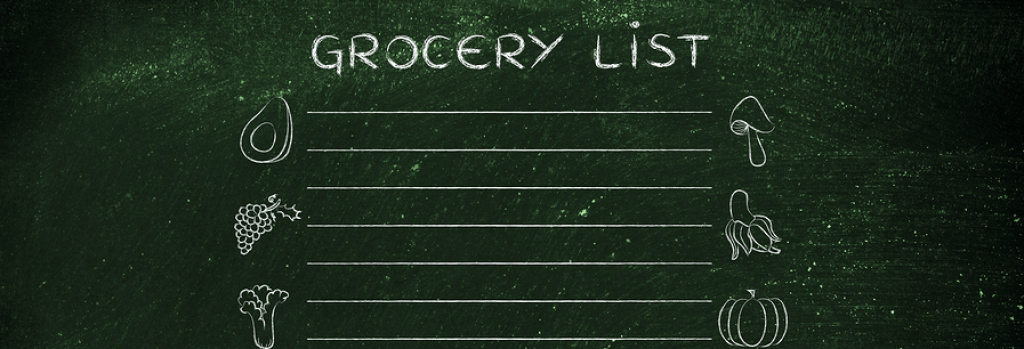
Meal planning is the process of planning out what meals you will eat for the coming days or weeks. It involves grocery shopping and making sure you have everything ready. Some people also add in meal prep, but that is optional.
The most important thing is that you know what you will be eating for all meals and snacks so that you are fully prepared. Here are some tips for getting started with meal planning: (you can also find more tips on how to plan a healthy diet here.)
Start with Foods You Already Enjoy
If you are new to a vegan way of eating, it helps to think of foods you already enjoy that are vegan-friendly. This helps to make a smoother transition into following this type of diet. This might be making fruit smoothies in the morning with almond milk and skipping the yogurt. Or maybe you enjoy something more savory like avocado toast. Sometimes, it will be a full meal, other times a snack or a side dish.
Make a Detailed Meal Plan
Once you have started adding some foods to your meal plan that you enjoy, you can make it more detailed. Try to list every meal and snack for the first week.
Keep in mind how many people you are feeding, and any days when you might not be home to cook so, you can prepare for those situations as well.
Write down what meals might work as leftovers, and don’t forget to use ingredients you already have at home.
Work on Your Grocery List
Once you're done with your the meal plan, it is easy to go down the list and add anything you don’t have to a grocery list. This is imperative before going to the store so you don’t forget anything. Be as detailed as you can, including quantities of certain ingredients. If you forget or run out of something in a few days, it is harder to avoid those non-vegan foods you might still have around the house.
Guidelines for Vegan Weight Loss
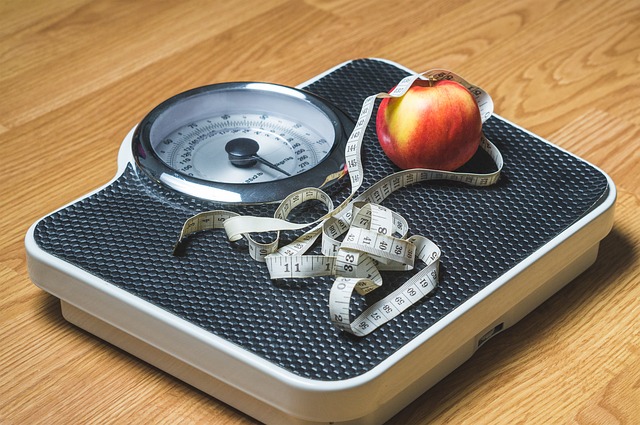
Being vegan generally means that you will live a healthier lifestyle, but it doesn't mean you'll instantly lose weight. The secret to losing weight is not just to eat foods that conform to a vegan diet. You'll also need to eat healthy foods that can supply your body with the vitamins and minerals it needs.
These tips will help you adhere to food preferences while aiding in your weight loss attempts.
Schedule Your Meals
Eating your meals at the same time each day is essential if you want to improve your metabolism.
Ayurveda teaches us to take a medium meal for breakfast, large for lunch, and small meals for dinner. You want to make lunch the main meal of the day because your ability to digest food is most significant between 10 am – 2 pm. Good digestion = good health.
Also, try exercising forty-five minutes before you eat to help feed and repair your used muscles.
Don’t eat two hours before bedtime. Eating calories close to bedtime can increase your weight, and you will probably have trouble sleeping.
Add Your Protein
One of the most common reactions vegans get when they speak about their diet is, “How do you get enough protein?” It's true that protein is an essential part of a healthy diet, but we don't need as much as many people think.
The recommended intake of protein is 5.5 ounces per day or 0.41g per pound of body weight.
For examples, a 150lbs woman should consume 61 grams of protein each day. Likewise, a 175 lbs man should consume 72g each day.
Since there are around 4 calories per gram of protein, the woman would need 244 calories of protein and the man 288 calories of protein daily.
You can refer to the list of food below for serving size and grams of protein.
1 cup of tempeh – 31g
1 cup of soybeans – 29g
3 ounces seitan – 21g
1 cup lentils – 18g
1 cup beans (chickpeas, black and kidney beans) – 15g
4 ounces tofu – 11g
1 cup quinoa – 8g (Learn about the health benefits of Quinoa here)
½ textured vegetable protein – 8g
2Tbs peanut butter – 8g
Healthy Drinks Have Calories Too
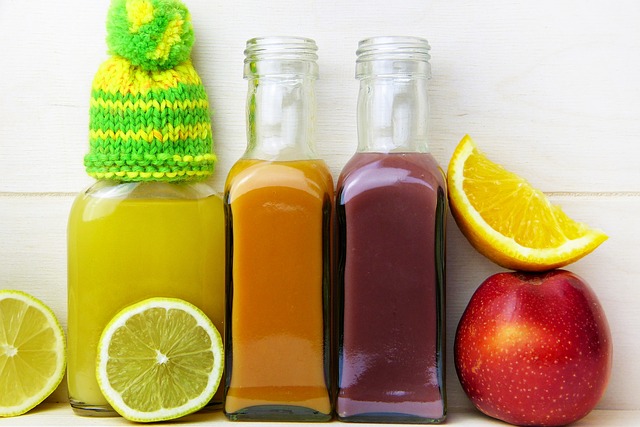
Before you dive into your usual smoothie or freshly squeezed juice, read the labels carefully or know how many calories it has. Merely drinking plain water is a safe bet. It’s hydrating and has zero calories. You can add squeezed lemon, lime, or both if you want some flavor. You can also try herbal teas and sparkling waters.
Avoid Binging
A vegan diet also urges you to eat in moderation. The average American consumes 22.2 tsp of sugar per day. If you’re looking for a healthy vegan dessert that is low in calories without sugar and fats, try fresh fruits or eating a small piece of vegan dessert. You can save the rest to eat in the following days.
Vegan Meal Ideas
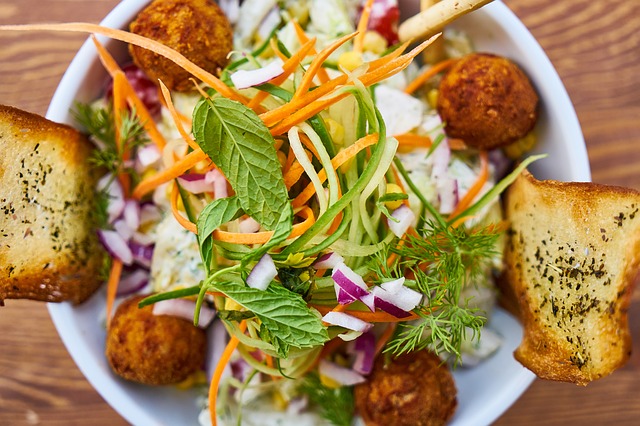
One of the difficult things when starting a vegan diet is shifting from your usual intake of meat and sweets to a lifestyle full of limited or zero processed food, and fresh and organic food.
It may seem tiresome at first when you start planning your meals, but this is important when you want to lose the extra weight you’re carrying.
Planning your meals is not only healthy, but it can also make your life easier. When you’re shifting to a vegan diet, you don’t have to dive into it immediately. You can just start easing your way into the diet and letting go of the food that you won’t need.
Beginners should start with their favorite foods and build their meal plan from there.
The health benefits of a vegan diet lie in eating plenty of whole foods. Fruits, vegetables, legumes, nuts, and whole grains are key to a successful vegan diet. If you choose to replace these with processed foods, which are often full of fat and high in sodium, you will miss out on the complete benefits of a vegan diet. You may find that your energy levels decrease and your weight loss is not as significant as you had hoped.
In addition, healthy vegan options are often high in fiber and water, keeping you full longer and aiding in your overall hydration levels.
If you find that you are not losing as much weight as you would like since going vegan, or that you aren't feeling well, take stock of your food choices. Make sure that you are eating plenty of whole foods and not filling up on processed ones.
Healthy Convenient Vegan Foods
Hummus
You can stop wasting money and make your own hummus at home. A basic hummus would include chickpeas, lemon juice, tahini, garlic, and olive oil. You can add your favorite spices as well as a variety of veggies.
Hummus can last up to five days in the refrigerator. You can eat hummus with any meal like on a sandwich, toast, or dips for veggies and chips.
Roast Your Vegetables Ahead
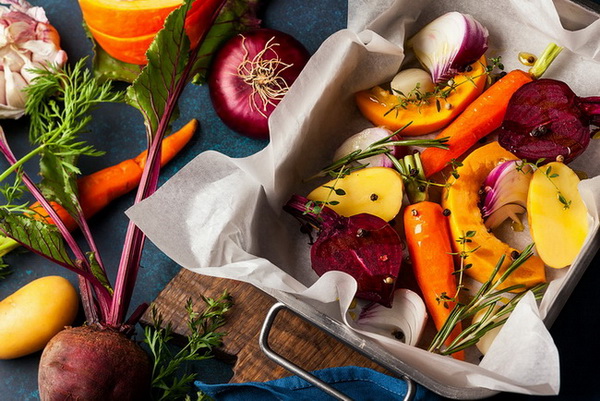 Roasted vegetables are quick, effortless, and delicious. And since almost all vegetables can be roasted, there are plenty of options.
Roasted vegetables are quick, effortless, and delicious. And since almost all vegetables can be roasted, there are plenty of options.
You can serve roasted vegetables warm or at room temperature with almost any grain, tofu, or salad. You can sprinkle them with chopped fresh herbs, or drizzle with avocado or olive oil. I love to roast a large pan of vegetables on Sunday afternoons so I have plenty of meal options throughout the week. This will make meals easier and less time-consuming.
Roast cauliflower, broccoli, sweet potatoes, onions, carrots, beets, and zucchini or whatever you like.
Vegan Egg Salad
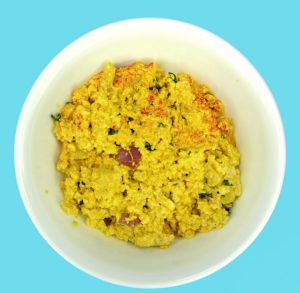 The wonderful thing about tofu is that it takes on the flavor of whatever it is cooked with. I like to keep this eggless salad ready-to-go for a quick snack or sandwich. It's full of protein, calcium and even some Omega 3 fats.
The wonderful thing about tofu is that it takes on the flavor of whatever it is cooked with. I like to keep this eggless salad ready-to-go for a quick snack or sandwich. It's full of protein, calcium and even some Omega 3 fats.
Mix one 14 oz of extra firm tofu that has been drained and mashed with a little egg-free mayonnaise. Add some fresh chopped parsley, a bit of green onion, garlic powder, sea salt, a pinch of yellow mustard, paprika, garlic powder and sea salt. I also sometimes add some half-mashed chickpeas to this salad. It's so yummy!
*(I like Primal Kitchen egg-free mayo very much and Thrive Market delivers it right to my door.)
Oatmeal with Nuts and Dried Fruit
Oatmeal is a quick and easy vegan breakfast. It's full of nutrition and will satisfy your hunger for hours at a time. You can use an InstaPot cooker or make it on the stovetop.
You can also make overnight oatmeal in the fridge for a fast, cold breakfast. Nuts add extra protein and healthy fats to keep your cravings low. Just be sure to check that your dried fruit doesn't have added a ton of added sugar. I usually pick up dried fruits at Trader Joes.
Grilled Portobello Steaks
Coat a clean portobello mushroom in oil, garlic, salt, and pepper, and then throw it on the grill. You can also sauté or roast a portobello steak, but grilling really brings out the portobello flavor.
Pair it with your favorite veggie side or brown rice for a tasty, filling meal. Portobello mushrooms are low in calories, high in fiber and rich in essential nutrients like copper.
Butternut Squash Soup
Hearty but still diet-friendly, butternut squash soup can be made with a roasted squash, almond milk, and a few spices for a quick and flavorful meal.
Make Veggies Your Focus
While this may seem like a no-brainer for the vegan diet, a lot of vegan eaters find themselves getting off track with things like potato chips, eggless pastas, and other quick snack items.
By making vegetables the focus of your meals and snacks, you'll be able to manage hunger and keep your calories low. An easy vegan small meal may be something like raw veggies and hummus or baba ghanoush, or a plate of sautéed veggies.
Swap Zucchini for Pasta
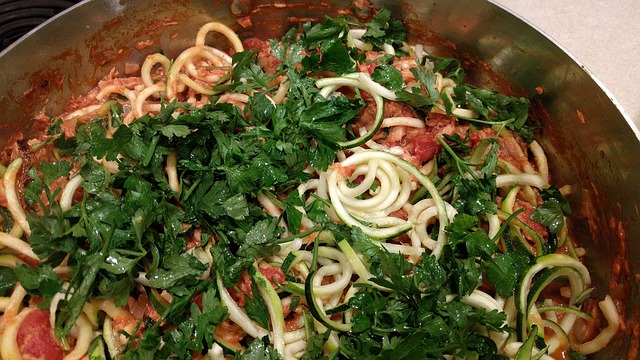
Two Favorite Vegan Cookbook Recommendations
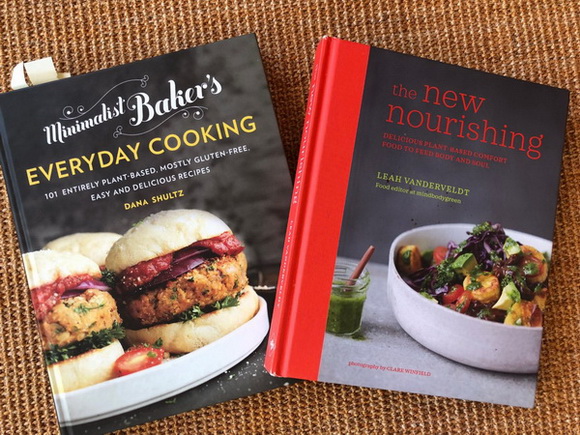
These are just a few menu ideas to get you thinking about eating a plant-based diet. I recommend getting a few vegan cookbooks for more detailed instructions.
I read every review on Amazon and ended up with these two vegan cookbooks.
The New Nourishing – Delicious Plant Based Comfort Food to Feed Body and Soul
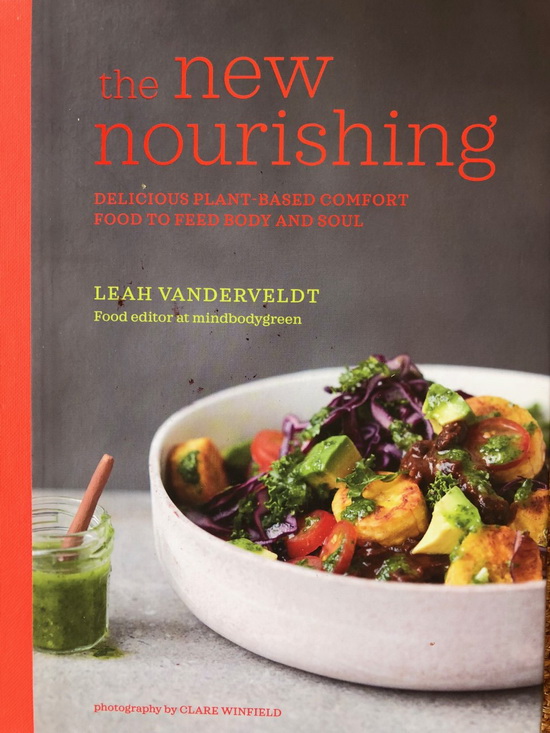
I like this book because first off, the book is gorgeous and it's full of quick, healthy recipes. It's a cookbook that I will use for life because it has a lot of recipes for comfort food, like Green Thai Soup, Sweet Potato & White Bean Stew and Pizza with Pesto Winter Squash. Oh, and one of the best kitchari recipes ever! (the link is to my kitchari recipe, but you can find this one on page 78).
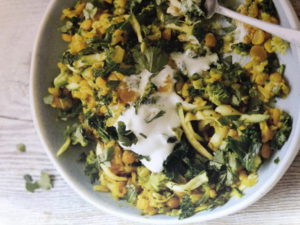
Minimalist Baker's – Everyday Cooking – 101 Entirely Plant-Based, Mostly Gluten Free, Easy and Delicious Recipes
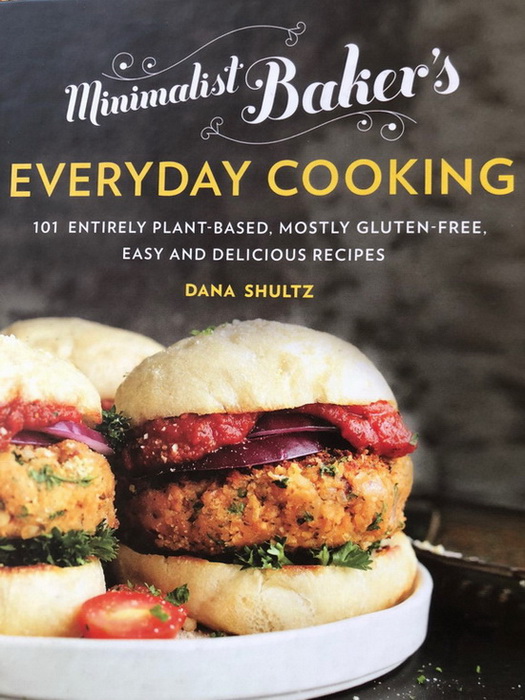
There's lots to love about this book.
The recipes are delicious and simple to make. You don't even need to be a pro in the kitchen because the author gives great instruction.
So far, I've made the White Bean Posole Verde, Garlic Scalloped Potatoes, Vegan “No Tuna” Salad Sandwich, Classic Vegan Lasagna, and the Jumbo Chocolate Chip Cookies.
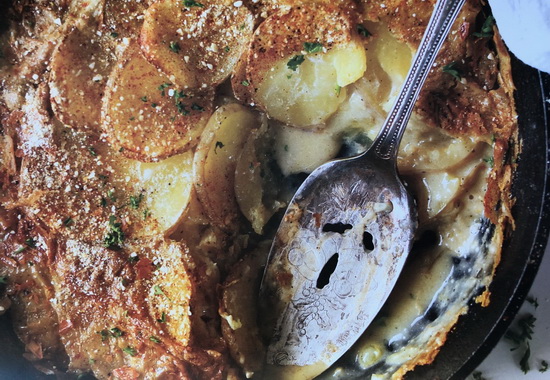
Everything has been amazing! I also appreciated that most of the recipes are simple and quick to make.
Both books are hardback and have full-color photos which will help to inspire you to try new things and stick with it.
Before you start with a vegan diet, make sure you somewhat committed to it and focus on foods rich in nutrients instead of empty calories.
If you're thinking about giving a vegan diet a go, give me some feedback in the comment area below and tell me why or what's motivating you. I always love hearing from you and get back within ‘hours' most of the time. xo
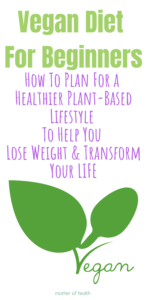

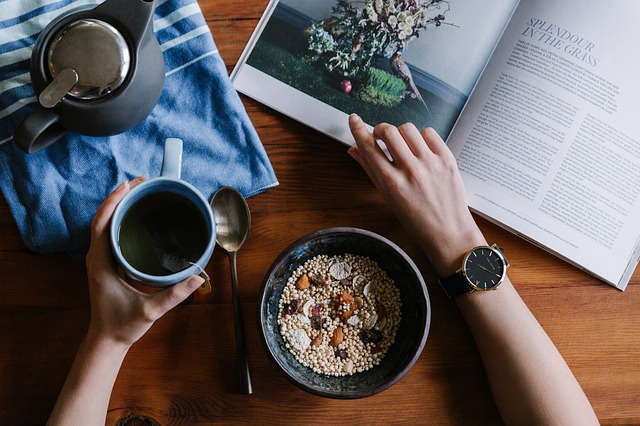
Thanks for emphasising that eating our meals at the same time each day is vital to improving our metabolism. Vegan foods are truly healthy and highly nutritious. I often eat Vegan’s foods even though I am not professed Vegan :). I haven’t tried Hummus so it is something of an assignment to undertake from your review. Wondering about tahini and the taste with garlic? Thanks for sharing.
Thanks for reaching out Skailait! If you like garlic, you will enjoy it in hummus! (if not, it’s fine to omit)